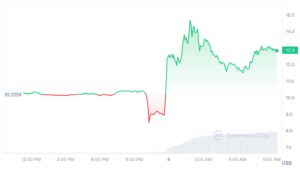
ENS Token Skyrockets 72% After Vitalik Buterin’s Endorsement
As a result of the admiration that Ethereum co-founder Vitalik Buterin had for the domain platform, the governance token of the Ethereum Name Service (ENS) experienced a 72% increase on January 3.
Buterin praised the Ethereum Name Service as “super important” in a post that he made on January 3 on X (which was formerly known as Twitter). He also reaffirmed that the platform ought to continue to be freely available and reasonably priced for all users of the Ethereum network, particularly those who are on layer-2 networks.
“All L2s should be working on trustless, merkle-proof-based CCIP resolvers,” stated Buterin. “This will allow us to have ENS subdomains that are registerable, updateable, and readable directly on L2s.”
However, Buterin believes that layer-2 networks, such as Optimism, Arbitrum, and Polygon, which are crucial components of the long-term scalability of Ethereum networks, should be able to register ENS addresses to make them more user-friendly.
According to data provided by CoinMarketCap, shortly after Buterin’s X post, the price of the ENS token skyrocketed from a yearly low of $8.50 to a high of $14.70, representing a rise of more than 72%. This was the highest price in eight months.

The ENS token surged 72% after an X post from Buterin. Source: CoinMarketCap
Since this article was published, ENS has reached a point of equilibrium and is currently trading at $12.90. When the cryptocurrency market as a whole started to fall and rapidly plummeted into an industry-wide bear market, ENS reached an all-time high of $74.25 on November 28, 2021.
This occurred at the same time that the larger crypto market began to fall. Users of cryptocurrencies can get a domain name ending in “.eth” using the Ethereum Name Service.
This replacement simplifies the process of sending and receiving money on the Ethereum network, eliminating the need for the complicated string of letters and numbers that typically make up a user’s wallet address.
Buterin put forth a proposal in September 2022 to impose a tax of three percent on ENS domain names. It was referred to as the “Harberger” tax proposal.
Buterin stated that this would discourage early users from stockpiling domain names to maximize revenues, which would allow for wider adoption of ENS addresses and a more decentralized ownership structure.
